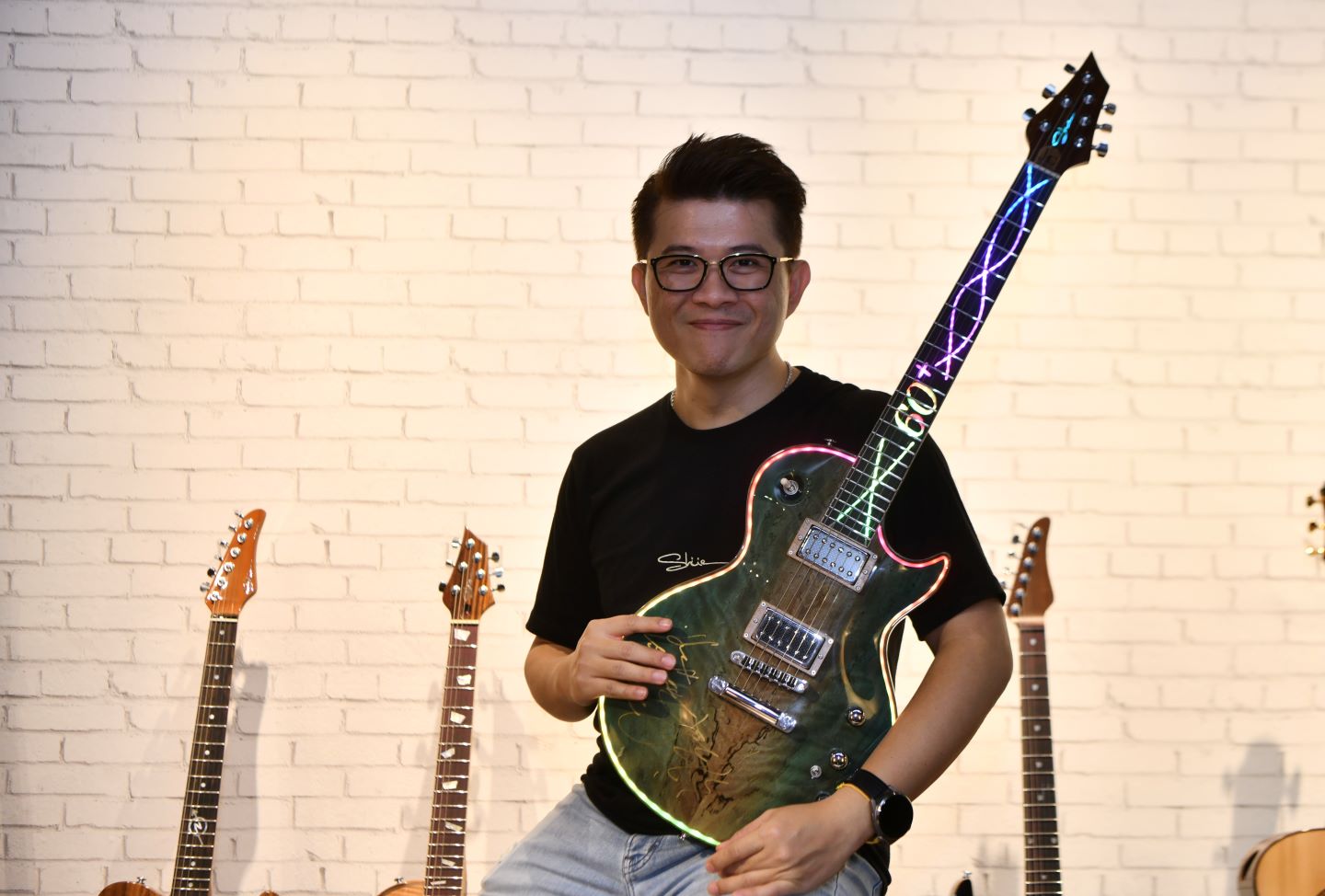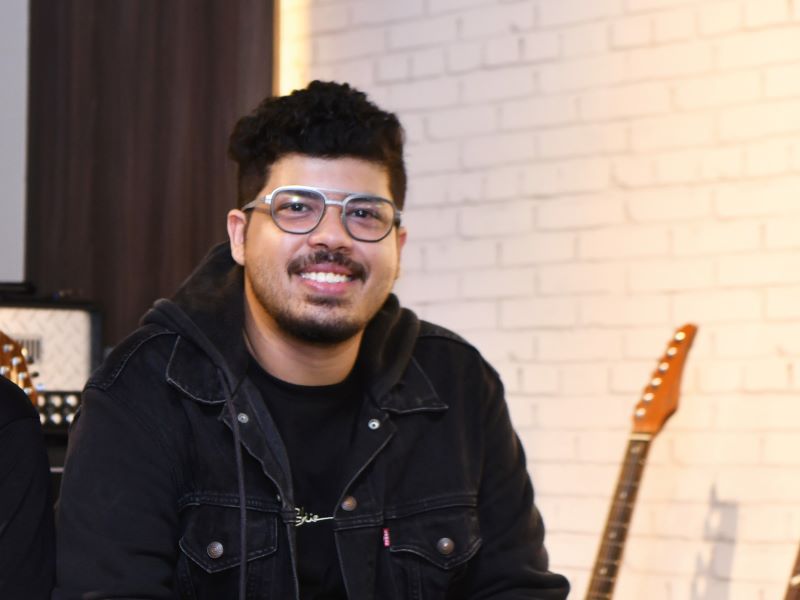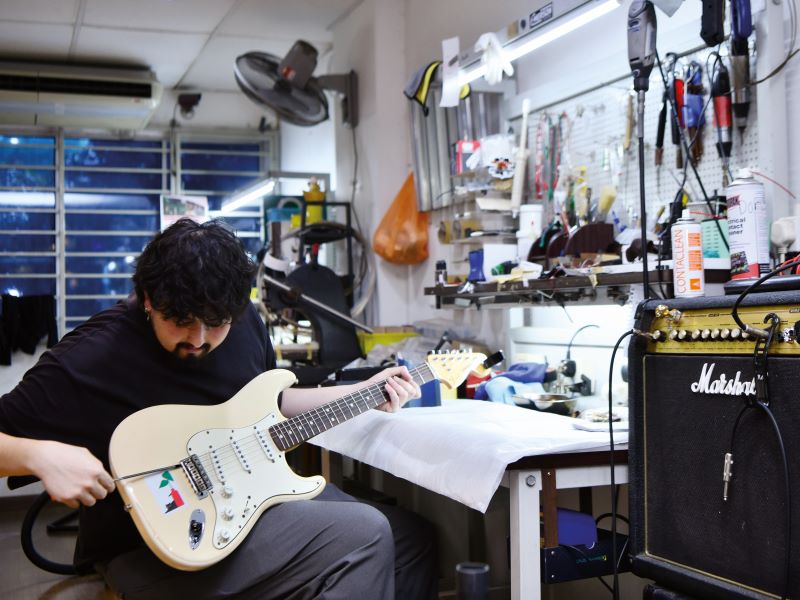
Raymond Choo has come a long way from his early days as a musician and repairing guitars (All photos: Sam Fong/The Edge)
Tucked away in a row of shophouses in a gated neighbourhood in Cheras, Kuala Lumpur, Shüe Guitars has quietly established itself as a strong contender in crafting and repairing the musical instrument. Operations manager Aaron Santa Maria, 29, takes us through the two-floor premises, which he describes as “a small place with big dreams”.
Specialising in both meticulous repairs and exquisite custom builds, this homegrown company with a workforce of 12 has set itself apart by adhering to uncompromising standards rivalling that of top American manufacturers. In doing so, it is elevating the art of guitar craftsmanship by creating masterpieces crafted with attention to detail and a commitment to superior quality, both visually and acoustically.
Santa Maria shows us the various guitars on display in the reception area, featuring sleek bodies in a variety of hues and a few with necks adorned with LED lights. Of the 14 woods offered, about nine come from Malaysia. The few sourced from abroad, such as maple from North America, are well known in the industry and used by major brands such as Fender and James Tyler.
“We all have very high standards as guitar players and collectors, so we understand the expectations at every price point, whether it’s a RM5,000 guitar or a RM100,000 masterpiece. It’s our responsibility to meet these expectations at our price point, ensuring that the quality matches the investment. Our experience makes us meticulous, not allowing even the smallest scratches or wood chips to pass unnoticed,” he says. This familiarity gives the company an upper hand.
20240613_peo_guitar_maker_14_sam.jpg

The process for designing and building a custom guitar usually starts with an idea, followed by discussions on materials, hardware and electronics. Designs often draw from existing models but the team is adept at creating unique, one-off pieces. Once the initial mock-up is approved, a technical 3D design is drafted and shared with the customer. The next step involves using computer numerical control (CNC) machine to cut the body, neck and other components as needed. Parts undergo test fitting before moving upstairs for sanding and painting, where colours are blended to enhance the natural wood grain.
“Moving to final assembly, our staff Jeffrey meticulously fits the electronics, hardware and structural components. Renowned for his neat electrical work, he ensures everything is in order. After a fresh set of Elixir strings is fitted, each guitar is set-up to achieve preferred action. In the final stages, we leave the guitar in our controlled holding room for a few days to adjust the string tension. Then, it undergoes inspection by myself, our boss, Ray, and our endorsee, Alexander Ching. If it meets our standards, it’s time for photos and delivery.”
The proprietor of this facility is Raymond Choo, 43, also known as Ray Akira, who started his musical career in 2003 on a cruise ship. He left the seas to perform at Resorts World Genting in Pahang, Singapore and Hong Kong before founding the Guitar Hospital in 2009, specialising in restoration and repairs. Through hands-on experience, learning from friends and mentorship, he discovered that guitar repair required unique solutions for each instrument, even with the same brand and model. This variability means there is no fixed method for restoring the instrument to working order.
20240613_peo_guitar_maker_15_sam.jpg

“My friends often compare what we do to dismantling a bomb because of the unpredictability and risk, especially when dealing with expensive guitars or those with great sentimental value, which can affect our reputation if not done right,” says Choo. That is certainly true, as even the smallest mistake can have significant consequences.
“Over time, I noticed many expensive guitars sent in had flaws which we could improve and that inspired me to start building the instrument myself,” he adds, explaining how Shüe (pronounced “shi”) Guitars came to be in 2018. From a one-man show, the company grew to seven employees but the Covid-19 pandemic reduced it back to just one.
“Once more, I had to rebuild the company from scratch. But this period allowed me to focus on research and development, designing and restructuring the business from the ground up. After the first Movement Control Order, I began expanding again. To my surprise, the response was overwhelmingly positive, with rapid growth in orders for repairs and custom-made guitars, as people started sharing their feedback on social media.”
20240613_peo_guitar_maker_21_sam.jpg

The team now targets serious players with premium materials and components. The company charges RM5,300 to RM7,800 for standard production models. Customers who know exactly what they want are directed to its Custom Shop models, which come with a price tag of RM8,800 onwards.
What sets Shüe Guitars apart from its counterparts and other international brands is the use of the lightweight Malaysian jelutong wood. This is in contrast to traditional American guitars known for their weight, which can be cumbersome for extended stage use. Inspired by the success of James Tyler guitars using Malaysian jelutong, rebranded as “Mamywo”, Shüe Guitars harnesses this unique material to offer instruments that rival the sound quality of expensive, American aged wood ones.
“In Malaysia, the wood industry typically focuses on heavy wood for furniture, undervaluing lighter, resonant options ideal for guitars. We tapped into this overlooked resource, emphasising user experience over mere material cost. As a musician myself, I understand the importance of the feel and playability, factors often compromised in mass-produced guitars,” says Choo.
20240613_peo_guitar_maker_12_sam.jpg

His clientele includes Sham Kamikaze, a prominent Malaysian guitarist currently touring with Jacky Cheung; Jamie Wilson, who plays for David Foster; and a diverse range of serious players and hobbyists. Choo aims to double or even triple the company’s size within two years and maintain consistent monthly supply to various countries.
Since joining the company at the end of last year, Santa Maria has built a website and put in place a comprehensive invoicing and inventory system while managing the day-to-day operations with staff and customers, including successfully reducing turnaround time from two weeks to mere days. He is modest about his contributions but speaks highly of the time he met Choo as a 14-year-old student who came in for guitar repair with little money. “Ray charged me a minimal fee and taught me simple repairs. He would even drop me at the LRT station so I could catch a train back. He has been very generous with his knowledge, time and effort from day one.
“I’m happy to be here. We have big goals and we are all working hard towards them. When there’s a project in the works, whether for me or for Ray, sleep takes a back seat until it’s accomplished. We’ve set our targets and with our robust infrastructure and resources, we’re determined to achieve them. Beyond the business aspect, we get to live our passion every day.”
For more information, visit shueguitars.com. Opening hours are 9am to 1pm and 2pm to 7pm, from Tuesdays to Saturdays.
This article first appeared on June 24, 2024 in The Edge Malaysia.


